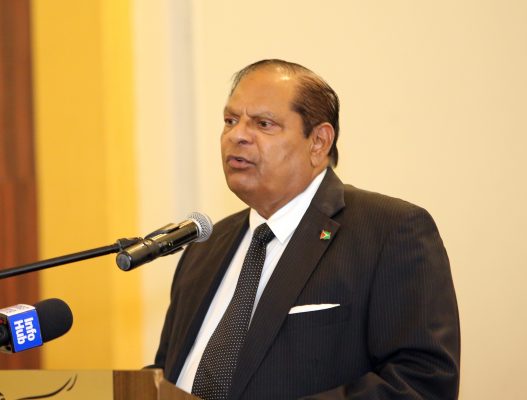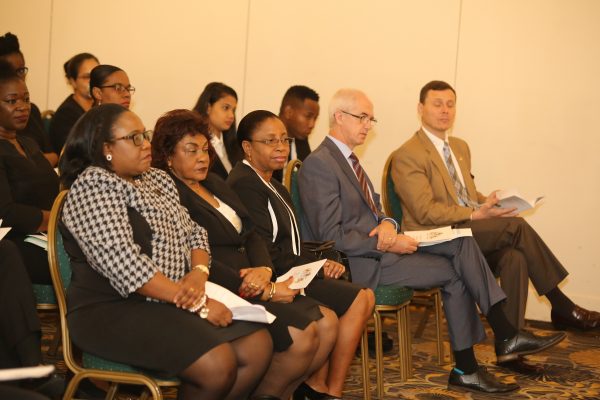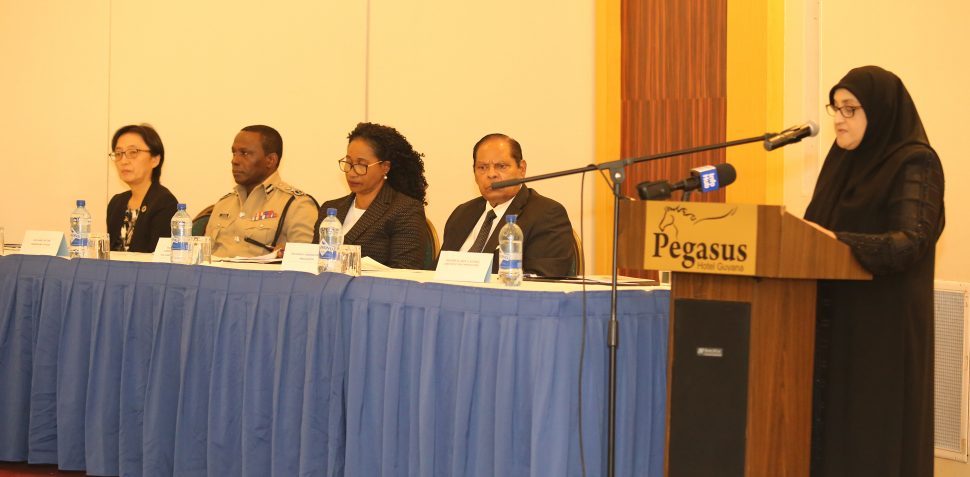The Office of the Director of Public Prosecutions (DPP) yesterday launched its code for prosecutors, which is intended to serve as a guide on determining whether criminal charges should be instituted.
The set of codified principles embodies the initiative of implementing uniformity in the laying of charges in order to ensure fairness to an accused person while at the same time balancing the public’s interest.
Expressing her pleasure with the launch of the code, DPP Shalimar Ali-Hack, during the simple launch at the Savannah Suite of the Pegasus Hotel, said that she has always had the desire to have such a code implemented in Guyana.
Ali-Hack, who noted that prosecutions are an integral part of the criminal justice system, said that the code holds to the hallmarks of integrity and transparency, while noting that it seeks to explain why and how prosecutors do what they do in the execution of their duties.

The code establishes a two-stage test in deciding whether a prosecution should be initiated or not—first focusing on the evidential stage, followed by the public-interest stage. Together, these are called the “full code test.”
The former embarks on an inquiry as to whether there exists sufficient evidence to provide a realistic prospect of conviction. If this is satisfied, a determination will then be made as to whether pursuing prosecution of a case is in the public’s interest.
If it is, then prosecution will be commenced and will be applied throughout the duration of a case, the DPP said, as she noted that circumstances can change.
Great care, she said, must always be taken by those who decide such issues, recognising that incorrect decisions can ruin lives and undermine confidence in the criminal justice system.

Ali-Hack emphasised that the process has to be so transparent that each person before the court knows the principles to be applied in deciding whether a case would be continued against them and the confidence that those principles would be applied regardless of association, family connections, wealth or any other personal factor.
According to the DPP, the code makes clear the basis upon which decisions in criminal cases will be made, while noting that it is an invaluable tool for ensuring that proper criteria are considered in every case and, very importantly, those same criteria are seen to be considered fairly and consistently.
According to the code, it reflects the aspiration and practices of prosecutors who adhere to the (1999) standards of the International Association of Prosecutors.
It says in the evidential stage of the full code test, prosecutors must be satisfied that there is sufficient evidence to provide a realistic prospect of conviction against each suspect on each charge.
They must also consider what the case for the defence may be and how it is likely to affect the prospects of conviction. According to the code, a case which does not pass the evidential stage must not proceed, “no matter how serious or sensitive it may be.”
The DPP said that the finding that there is a realistic prospect of conviction is based on the prosecutor’s objective assessment of the evidence. In making such a determination, she said that the prosecutor should consider whether the evidence can be used in court, whether it is reliable and whether it is credible.
Public interest
Regarding the public interest stage of the full code test, the DPP underscored that in every case where there is sufficient evidence to justify prosecution, prosecutors must go on to consider whether prosecution is required in the interest of the public.
Prosecutions, she said, do not automatically take place once the evidential stage is met. Instead, Ali-Hack said that a prosecution will usually take place unless the prosecutor is satisfied that there are public interest factors tending against prosecution, which outweigh those tending in favour.
Noting that this list is by no means exhaustive and would have to be applied on a case-by-case basis, the DPP said that in making the public-interest determination a prosecutor must ask how serious is the offence committed, what is the level of culpability of the suspect and what are the circumstances of and the harm caused by the victim.
She said too that the prosecutor must consider whether a suspect was under the age of 18 at the time the offence was committed, what is the impact on the community, whether prosecution is a proportionate response and whether persons/sources providing information require protection.
Apart from the full code tests, the DPP explained that the code for prosecutors to follow also caters for a threshold test. This test, she said, may only be applied when the suspect presents a substantial bail risk and not all the evidence is available at the time when he or she must be released from custody unless charged.
Under this test two key considerations must be borne in mind, including whether there is reasonable ground for suspicion and whether further evidence could be gathered to provide a realistic prospect of conviction.
Ali-Hack said that a decision to charge under the threshold test must be kept under review as the evidence has to be regularly assessed to ensure that the charge is still appropriate and that continued objection to bail is justified.
The DPP said that the prosecutors’ code is nothing new to other prosecutorial bodies the world over as it has already been implemented in other parts of the Caribbean and even forming part of the law in jurisdictions such as Canada.
A similar code has already been implemented in other parts of the Caribbean, such as Antigua and Barbuda, Barbados, Dominica, Grenada, Jamaica, St. Kitts and Nevis, St. Vincent and the Grenadines and St. Lucia.
The code was realised through collaboration with the DPP’s office, the United Nations Office on Drugs and Crime (UNODC) and funded by the Government of the United States of America. But Ali-Hack emphasised that the code is a Guyanese one made by her office for Guyanese prosecutors.
DPP Ali-Hack said that the code was drafted by British attorney David Robinson, who worked at the UN office here for some time and in 2006 worked as the legal director to the UK government for a body which investigated alleged miscarriage of justice in complex cases heard in England and Wales.
She said it is hoped the code will prevent the very miscarriage of justice in Guyana.
The DPP said that Robinson was unable to be at yesterday’s launch as he is at his current posting in Nairobi, Kenya, where he is the Regional Anti-Corruption Advisor for East Africa. She, however, expressed gratitude to him and the UNODC, Georgetown, by which the project was facilitated and financed.
Improving justice system
Meanwhile, United Nations Representative Mikiko Tanaka on behalf of the UNODC said that the code represents a significant criminal justice initiative which will positively affect Guyana and beyond.
In commending the code to the people of Guyana, she said that the UN was pleased to be associated with the realisation of the code which she said will aid in a more transparent justice criminal system.
Pledging his support for the code and committing to continued collaboration with the office of the DPP, Deputy Commissioner of Police Paul Williams said that the police force will immediately embark on training with the code as a means of improving its fight against crime and bringing criminals to justice.
Describing the launch of the code as monumental for the criminal justice system, acting Chancellor of the Judiciary, Yonette Cummings-Edwards said it can be used as an important prosecutorial tool in bringing offenders to justice.
Stating that it is both user- and reader-friendly, Justice Cummings-Edwards said that implementation of the code would have raised the bar for higher standards of prosecutions.
While lauding the efforts of all involved in bringing the code to fruition, Prime Minister Moses Nagamootoo opined that the guiding principles therein will indeed assist greatly in improving the standard of the criminal justice system.
He said that the code will not only ensure that justice is done, but that it is manifestly seen to be done as the transparency which it affords will allow for greater public understanding and participation in the entire process of criminal prosecutions.
The Prime Minister noted, too, as did both the Chancellor and the DPP, that in following the code in ensuring that only cases with a real prospect of success is prosecuted, then it will rid the justice system of cases which are doomed for failure and reduce the backlog and even overcrowding in the prisons.










